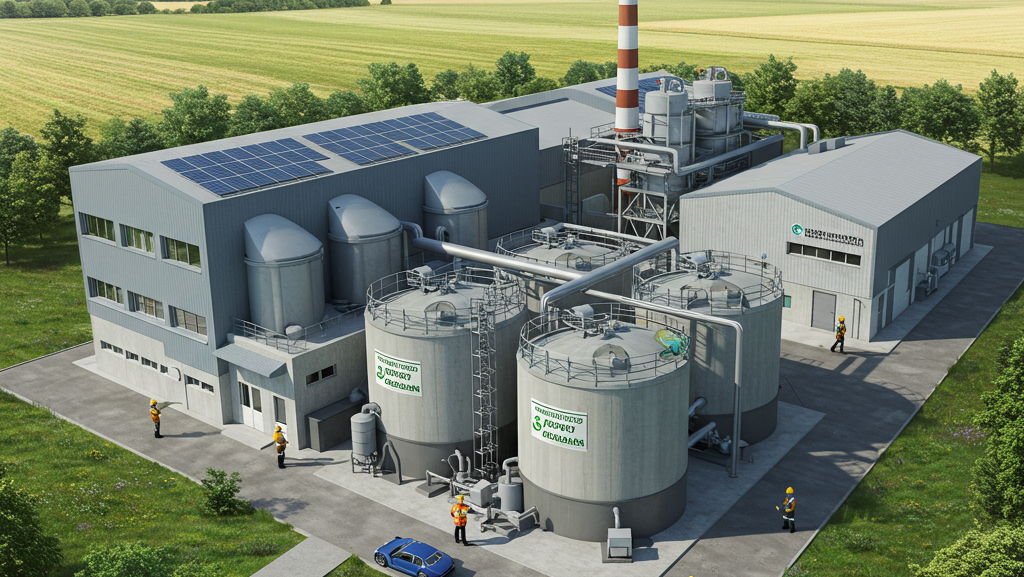Introduction to Farm-Themed Podcasts
In recent years, the digital landscape has evolved significantly, giving rise to a diverse array of content formats, including podcasts. Among these, farm-themed podcasts have gained considerable traction, reflecting a growing interest in agriculture and sustainable practices. As individuals become more aware of where their food comes from and the intricacies of production, farm-themed podcasts serve as a vital resource for education and engagement.
These audio programs allow farmers, experts, and enthusiasts to share their stories, insight, and experiences, fostering a sense of community among listeners. Storytelling is a powerful tool in this regard; it not only makes the content relatable but also highlights the challenges and triumphs associated with agricultural life. By sharing vivid narratives, hosts can create an emotional connection with their audience, turning abstract concepts into tangible realities.
Moreover, the relevance of farm-themed podcasts extends beyond mere storytelling. They provide an accessible platform to discuss pressing issues facing the agricultural sector, such as climate change, sustainable farming practices, and food security. With an increase in interest surrounding these topics, podcasts present a unique opportunity to engage a wider audience in meaningful conversations about the future of farming.
As society shifts toward a greater appreciation for local produce and the stories behind them, farm-themed podcasts have found a niche audience eager to learn and participate. This format not only serves to educate but also empowers listeners, encouraging them to make informed choices about their food systems and engage in activism if desired. In the end, farm-themed podcasts are not just about agriculture; they represent a larger movement toward transparency, community involvement, and sustainable practices in today’s world.
Identifying Your Podcast Niche
When embarking on the journey of creating a farm-themed podcast, the first step involves identifying your niche within the diverse farming community. This process is crucial, as it guides the direction and content of your podcast, ensuring it resonates with a specific audience. The farming sector encompasses various types, including organic, traditional, and urban farming, each with its unique challenges, innovations, and audience interests.
To effectively define your niche, consider the type of farming that resonates most with you. Organic farming, for instance, focuses on sustainable practices and might appeal to environmentally conscious listeners. Traditional farming could attract an audience interested in age-old practices and heritage crops, whereas urban farming may engage younger, city-dwelling individuals seeking local food solutions and innovative agricultural methods. By honing in on a specific type of farming, you can curate content that not only educates but also invites discussions around common challenges and triumphs within that domain.
In addition to determining the type of farming, identifying your target audience is equally important. Your podcast could cater to various groups such as farmers looking to learn new techniques, consumers eager to understand where their food comes from, or educators who aim to impart valuable knowledge to their students. Understanding your audience’s demographics will allow you to tailor your content, style, and approach effectively, leading to a more engaged and loyal listener base.
It’s also worthwhile to explore potential themes that can serve as focal points for your episodes. Topics such as sustainability, technology in farming, and historical farming practices all hold relevance in today’s agricultural discussions. By weaving these themes into your podcast, you create opportunities for rich conversations and informative interviews that will captivate your audience’s interest.
Crafting Your Podcast Format
When embarking on the journey of launching a farm-themed podcast, selecting the right format is crucial to its success. Different podcast formats serve varied purposes and can significantly influence listener engagement and the overall messaging of the show. In this section, we will explore several popular podcast formats, emphasizing how they can be tailored to align with the goals of your farm-themed endeavor.
One prevalent format is the interview style, which involves engaging with guests who possess expertise or unique stories related to agriculture, farming practices, or rural life. This format not only enriches the content but also allows for diverse perspectives, appealing to listeners eager to hear firsthand accounts from individuals in the farming community. An interview podcast fosters deeper conversations, making it a great choice for listeners interested in learning about the personal experiences and insights of farmers, agronomists, or other agricultural stakeholders.
Another option is solo storytelling, where the host shares personal reflections, anecdotes, or knowledge from their own farming experiences. This format allows for a personalized connection between the host and the audience, creating an intimate listening atmosphere. By sharing stories that resonate with listeners, the host can evoke a sense of community and inspire a greater appreciation for agricultural practices.
Panel discussions can also effectively convey varying viewpoints and encourage dialogue around current topics in farming. This format invites multiple guests to engage in a collaborative conversation, offering listeners a multifaceted understanding of complex issues in the agricultural sector. Educational series, meanwhile, focus on providing structured information on specific farming topics, making them ideal for listeners seeking to enhance their knowledge.
Ultimately, the format you select should be aligned with your podcast’s goals and resonate with your target audience. Each format offers unique advantages and opportunities to foster meaningful conversations about farming and agriculture.
Developing Compelling Content
Creating engaging content is essential for a successful farm-themed podcast. An effective way to start this process is by brainstorming ideas that resonate with the audience. Consider the interests and needs of your listeners, focusing on topics that are pertinent to contemporary issues facing the agricultural community. By understanding what information or stories resonate with your target audience, you can develop captivating episode themes that foster connection and engagement.
Story arcs play a crucial role in the overall structure of your podcast episodes. Each episode should have a clear beginning, middle, and end. Start with an introduction that sets the stage, followed by the main content that delves deeper into the topic, and conclude with reflections or actionable takeaways. This structure not only enhances comprehension but also keeps listeners invested in the narrative, prompting them to return for future episodes.
Selecting the right guests can significantly enrich your podcast. Invite experienced farmers, industry experts, or advocates who possess valuable insights or unique experiences to share. Having diverse voices contributes to a well-rounded discussion, providing authenticity to your podcast. Be sure to communicate with your potential guests beforehand to discuss the episode’s direction and create a comfortable environment that encourages open dialogue.
Lastly, incorporating listener questions can foster community involvement, making your audience feel valued and heard. Encourage listeners to send in questions or topic suggestions via social media or email, and include their input in your episodes. This practice not only enhances engagement but also helps ensure your content remains relevant to the audience’s interests. Authenticity and relevance are vital in storytelling, making it essential to remain true to your voice while addressing topics that matter to your listeners.
Technical Setup and Recording Basics
Launching a podcast requires careful consideration of the technical setup, which is essential for producing high-quality audio content. The first step in this journey is selecting the right equipment. A quality microphone is paramount, as it captures your voice clearly and reduces background noise. For most podcasters, a USB microphone is a practical choice due to its ease of use and affordability. Conversely, XLR microphones offer superior audio quality but require an audio interface, making them more suitable for those willing to invest in their podcasting journey.
Recording software, often referred to as a digital audio workstation (DAW), is another critical component of your podcasting setup. Popular options include Audacity, GarageBand, and Adobe Audition, each offering a range of features to cater to various skill levels. These programs allow for audio recording, editing, and mixing, so it is advisable to choose one that aligns with your expertise and specific podcasting needs. Headphones are equally important, as they enable you to monitor audio quality while recording and during editing sessions. A closed-back model is ideal for blocking outside noise and preventing audio leakage.
In addition to equipment, creating an optimal recording environment is crucial for enhancing audio quality. Seek a quiet space with minimal background noise, avoiding areas with echoes or sound reflections. Soft furnishings, such as carpets and curtains, can help absorb sound and improve acoustics. If feasible, consider utilizing soundproofing techniques or acoustic panels in your recording area to further reduce unwanted noise.
By mastering these technical aspects and ensuring a conducive recording environment, podcasters can significantly improve the clarity and overall quality of their content, paving the way for engaging farm-themed discussions.
Editing and Producing Your Episodes
Once you’ve recorded your podcast episodes, the next crucial step is editing and producing them to ensure a polished and engaging final product. For beginners, user-friendly software options such as Audacity, GarageBand, or Adobe Audition are excellent starting points. Each software package has its unique features and capabilities, which can accommodate various editing needs, ranging from simple trimming to more advanced functions like multi-track editing. Investing time in learning the tools available will significantly enhance your production process.
Edit your episodes with an eye toward clarity and flow. Remove any long pauses, filler words, or mistakes to create a seamless listening experience. Transitioning smoothly between segments can also help maintain the audience’s attention. Furthermore, consider the pacing of your content; too fast may overwhelm the listener, while too slow may lead to disengagement. Striking a balance is key to keeping your audience engaged throughout the episode.
Sound design plays a paramount role in enhancing the overall listener experience. Integrating background music and sound effects can add depth and dimension to your podcast, making it more enjoyable and memorable. Choose music that fits the tone of your farm-themed podcast, ensuring it complements rather than distracts from the dialogue. Sound effects can also bring your stories to life, creating an immersive experience that transports listeners to the setting you describe. It is important to keep the audio quality high; therefore, invest in good microphones and soundproof your recording environment as much as possible.
By focusing on effective editing techniques and sound design, you can produce episodes that not only convey information but also captivate and delight your audience. Understanding these foundational aspects of podcast production will prepare you for a successful launch and help establish a loyal listener base.
Launching Your Farm-Themed Podcast
Embarking on the journey to launch a farm-themed podcast requires careful planning and execution. The first crucial step is selecting a reliable podcast hosting platform. There are numerous options available, catering to various needs such as unlimited storage, distribution capabilities, and analytics. Popular platforms like Podbean, Libsyn, and Anchor provide user-friendly interfaces and essential features designed to help you reach your audience effectively. Evaluating your budget and goals will assist you in making an informed choice.
Next, creating an engaging podcast cover that resonates with your farm theme is essential. Your podcast cover is often the first introduction potential listeners will have to your show; therefore, it should be visually appealing and reflective of your content. Consider utilizing vibrant imagery related to farming or nature, along with a legible font that captures the essence of your podcast. Online tools, such as Canva, offer templates specifically designed for podcast covers, simplifying the design process.
Moreover, writing enticing episode descriptions serves to attract and retain an audience. Each description should provide a concise overview of the episode’s content, highlighting key topics discussed. Incorporate keywords relevant to farming to optimize discoverability, while ensuring the description remains engaging and informative. Keep variations in sentence structure to maintain reader interest and clearly convey the value of tuning in.
Timing plays a pivotal role in the successful launch of your podcast. Aim for a strategic release schedule that aligns with your target audience’s listening habits. Consider launching with a few episodes ready to provide listeners with a taste of your content and foster binge-listening. By thoughtfully planning your rollout strategy, you set a strong foundation for your podcast’s growth and establish a dedicated listener base.
Marketing and Growing Your Audience
Successfully marketing your farm-themed podcast requires a multi-faceted approach focused on audience engagement and targeted outreach. One efficient strategy is to harness the power of social media platforms. Utilizing channels like Instagram, Facebook, and Twitter, you can share snippets of your episodes, behind-the-scene insights, or engaging visuals related to farming themes. Regularly interacting with followers by reposting user-generated content and responding to comments can foster a vibrant community, enhancing listener loyalty and interest.
Cross-promoting with other podcasts can also amplify your reach significantly. Identify podcasts within the agricultural sector or those that cater to similar audiences. Engage in collaborative episodes, guest appearances, or social media shout-outs, which can introduce your content to another established listener base. This technique not only helps to grow your audience organically but also establishes credibility through association.
Leverage farming communities by connecting with organizations, local farms, and agricultural forums. These platforms often welcome multimedia content that resonates with their members. You can advertise your podcast through newsletters, forums, and community boards, offering special episodes or addressing topics of interest within the farming community. Engaging with these groups provides insights into their preferences, informing your content strategy and making it more relevant.
Engagement with listeners is also crucial for sustained growth. Encourage feedback through surveys or social media polls to gather insights on what topics resonate the most. Furthermore, consider hosting community events such as live recordings or Q&A sessions, which not only allow for direct listener interactions but also help in building a dedicated listener base. Through these comprehensive marketing strategies, your farm-themed podcast can effectively establish its presence and grow an engaged audience over time.
Measuring Success and Evolving Your Podcast
As you embark on the journey of creating a farm-themed podcast, establishing a framework to measure its success is essential. Effective measurement provides insight into your podcast’s performance and identifies areas for improvement. One of the most prevalent metrics to track is the number of downloads. This figure reflects how many times your episodes have been accessed, which is a key indicator of popularity. Additionally, tracking listener demographics helps understand your audience better, revealing aspects such as age, location, and interests.
Another crucial metric is listener retention, which assesses how many listeners stay engaged throughout the duration of each episode. High retention rates often signify that your content resonates with your audience, while lower rates may indicate the need for adjustments in format, length, or topics covered. Additionally, examining review ratings and feedback allows hosts to gauge listener sentiment and adapt accordingly, ensuring the content remains relevant and engaging over time. Platforms such as Spotify and Apple Podcasts provide valuable dashboards for tracking these metrics, enabling hosts to make data-driven decisions.
Incorporating audience engagement strategies is essential for evolving your podcast. Actively inviting listener feedback through surveys or social media interactions can offer priceless insights into their interests and preferences. This could involve requesting suggestions for future topics or special guests related to agriculture and farming. Listeners appreciate when their voices are heard, fostering loyalty and encouraging word-of-mouth promotion.
Finally, continuously evolving your podcast based on analytics and audience feedback will help sustain listener interest. This may involve experimenting with different formats, such as interviews with guest farmers or discussions on industry innovations, coupled with integrating new content based on seasonal themes. By staying attuned to your audience’s desires and leveraging key performance metrics, you can create a farm-themed podcast that grows and flourishes alongside your audience.





